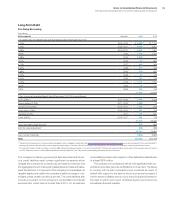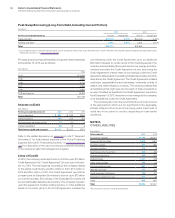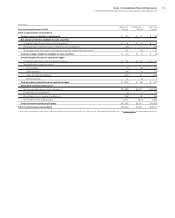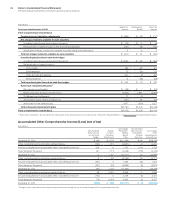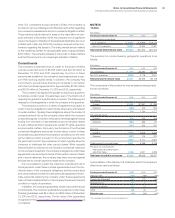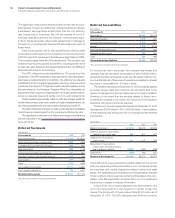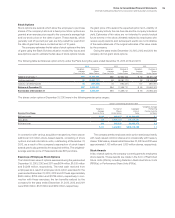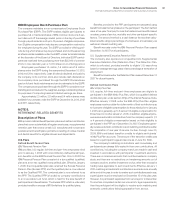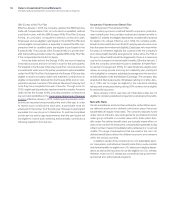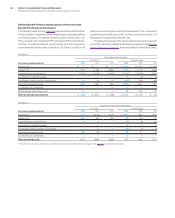IBM 2013 Annual Report Download - page 121
Download and view the complete annual report
Please find page 121 of the 2013 IBM annual report below. You can navigate through the pages in the report by either clicking on the pages listed below, or by using the keyword search tool below to find specific information within the annual report.Notes to Consolidated Financial Statements
International Business Machines Corporation and Subsidiary Companies
120
service program processing in Indiana. The State terminated the con-
tract, claiming that IBM was in breach, and the State is seeking damages.
IBM believes the State’s claims against it are without merit and is seeking
payment of termination amounts specified in the contract. After six
weeks of trial, on July 18, 2012, the Indiana Superior Court in Marion
County rejected the State’s claims in their entirety and awarded IBM $52
million plus interest and costs. On February 13, 2014, the Indiana Court
of Appeals reversed portions of the trial judge’s findings, found IBM in
material breach, and ordered the case remanded to the trial judge to
determine the State’s damages, if any. The Indiana Court of Appeals
also affirmed approximately $50 million of the trial court’s award of dam-
ages to IBM. This matter remains pending in the Indiana courts.
IBM United Kingdom Limited (IBM UK) initiated legal proceed-
ings in May 2010 before the High Court in London against the IBM
UK Pensions Trust (the UK Trust) and two representative benefi-
ciaries of the UK Trust membership. IBM UK is seeking a
declaration that it acted lawfully both in notifying the Trustee of the
UK Trust that it was closing its UK defined benefit plans to future
accruals for most participants and in implementing the company’s
new retirement policy. The trial in the High Court concluded in April
2013 and the company is awaiting a ruling from the Court. In addi-
tion, IBM UK is a defendant in approximately 290 individual actions
brought since early 2010 by participants of the defined benefits
plans who left IBM UK. These actions, which allege constructive
dismissal and age discrimination, are pending before the Employ-
ment Tribunal in Southampton UK and are currently stayed pending
resolution of the above-referenced High Court proceedings.
In a separate but related proceeding, in March 2011, the Trustee
of the IBM UK Trust was granted leave to initiate a claim before the
High Court in London against IBM UK and one member of the UK
Trust membership, seeking an order modifying certain documents
and terms relating to retirement provisions in IBM UK’s largest
defined benefit plan (the C Plan) dating back to 1983. The trial of
these proceedings began in May 2012 and finished in early June.
On October 12, 2012, the High Court in London issued its ruling,
holding that the 1983 Trust Deeds and Rules should be modified to
allow certain categories of current IBM UK employees who are
members of the C Plan to retire from the age of 60 (rather than from
the age of 63) without actuarial reduction of their defined benefit
pension. In a supplementary ruling on December 13, 2012, the Court
declined to similarly modify the Trust Deeds and Rules for former
employees who were C Plan members and who left the company
prior to retirement. On February 7, 2013, the Court issued an order
agreed to by all parties, under which there will be no appeals of the
October 2012 and December 2012 judgments. As a result of the
October 2012 ruling, IBM recorded an additional pre-tax retirement-
related obligation of $162 million in the third quarter of 2012.
In March 2011, the company announced that it had agreed to settle
a civil enforcement action with the Securities and Exchange Commis-
sion (SEC) relating to activities by employees of IBM Korea, LG IBM, IBM
(China) Investment Company Limited and IBM Global Services (China)
Co., Ltd., during the period from 1998 through 2009, allegedly in violation
of the Foreign Corrupt Practices Act of 1977. As part of that settlement,
IBM consented to the entry of a judgment relating to the books and
records and internal control provisions of the securities laws, and also
agreed to pay a total of $10 million, categorized by the SEC as follows:
(i) $5.3 million, representing profits gained as a result of the conduct
alleged in the SEC’s complaint, (ii) prejudgment interest on that amount
of $2.7 million, and (iii) a civil penalty of $2 million. On July 25, 2013, the
court approved that 2011 settlement and required that for a two-year
period IBM make reports to the SEC and the court on certain matters,
including those relating to compliance with the FCPA. In early 2012, IBM
notified the SEC of an investigation by the Polish Central Anti-Corruption
Bureau involving allegations of illegal activity by a former IBM Poland
employee in connection with sales to the Polish government. IBM is
cooperating with the SEC and Polish authorities in this matter. In April
2013, IBM learned that the U.S. Department of Justice (DOJ) is also
investigating allegations related to the Poland matter, as well as allega-
tions relating to transactions in Argentina, Bangladesh and Ukraine. The
DOJ is also seeking information regarding the company’s global FCPA
compliance program and its public sector business. The company is
cooperating with the DOJ in this matter.
In May 2013, IBM learned that the SEC is conducting an inves-
tigation into how IBM reports cloud revenue. IBM is cooperating
with the SEC in this matter.
In December 2013, a putative class action lawsuit was filed
in the United States District Court for the Southern District of
New York related to the company’s third-quarter 2013 financial
results disclosure. The company, its Chairman, President and
Chief Executive Officer, and a former Senior Vice President and
Chief Financial Officer of the company are named as defendants.
Plaintiffs allege that defendants violated Section 20(a) and Section
10(b) of the Securities Exchange Act of 1934, and Rule 10b-5
thereunder.
The company is a defendant in numerous actions filed after
January 1, 2008 in the Supreme Court for the State of New York,
county of Broome, on behalf of hundreds of plaintiffs. The com
-
plaints allege numerous and different causes of action, including
for negligence and recklessness, private nuisance and trespass.
Plaintiffs in these cases seek medical monitoring and claim dam-
ages in unspecified amounts for a variety of personal injuries and
property damages allegedly arising out of the presence of ground-
water contamination and vapor intrusion of groundwater
contaminants into certain structures in which plaintiffs reside or
resided, or conducted business, allegedly resulting from the
release of chemicals into the environment by the company at its
former manufacturing and development facility in Endicott. These
complaints also seek punitive damages in an unspecified amount.
The company is party to, or otherwise involved in, proceedings
brought by U.S. federal or state environmental agencies under the
Comprehensive Environmental Response, Compensation and
Liability Act (CERCLA), known as “Superfund,” or laws similar to
CERCLA. Such statutes require potentially responsible parties to
participate in remediation activities regardless of fault or ownership
of sites. The company is also conducting environmental investiga-
tions, assessments or remediations at or in the vicinity of several
current or former operating sites globally pursuant to permits,
administrative orders or agreements with country, state or local
environmental agencies, and is involved in lawsuits and claims
concerning certain current or former operating sites.
The company is also subject to ongoing tax examinations and
governmental assessments in various jurisdictions. Along with many





